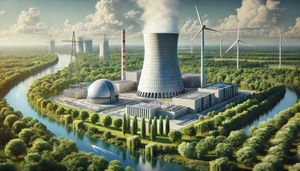The resurgence of nuclear power is underway, and its connection to the booming energy demands of artificial intelligence (AI) is reshaping not just energy markets, but also public perception of nuclear energy. Once considered controversial and laden with the shadow of past disasters, nuclear is now gaining fresh attention as companies scramble to meet the soaring needs of data centers powering AI technologies.
The shift began with substantial stock surges for utility companies, particularly those operating nuclear power facilities. Constellation Energy, for example, boasts the largest share of nuclear power production in the U.S., enjoying incredible stock performance marked by a remarkable rise of 121% this year alone. Similarly, Vistra has seen its stock soar by 208%. The timing of these increases is telling, as major agreements emerge linking these utilities with tech giants. On September 20, 2024, Constellation Energy signed a pivotal deal with Microsoft, agreeing to supply power from the Three Mile Island nuclear facility. This news marks the first time since 2019, when the plant was closed, and reignites discussions about reopening dormant nuclear facilities.
Three Mile Island, long infamous for the 1979 partial meltdown, is experiencing renewed focus. Though Unit 2 suffered the brunt of the disaster, the currently operational Unit 1 has remained idle since 2019, stopped by market conditions rather than safety concerns. The plant is expected to be relaunched as the Crane Clean Energy Center by 2028, if Constellation's plans come to fruition and regulatory hurdles can be overcome.
This trend isn't isolated to one plant. Reports indicate several other nuclear facilities across the country, such as the Palisades plant in Michigan and Duane Arnold plant in Iowa, are also being readied for potential revitalization. This momentum finds its roots directly intertwined with some of the heftiest energy demands imposed by AI technologies, particularly by supercomputers extensively used for data processing and AI model training.
Advanced AI relies heavily on supercomputers engineered by semiconductor firms like Nvidia. These data-heavy operations consume electricity at astronomical rates. Research suggests one single query sent to platforms like ChatGPT could consume enough energy to power a lightbulb for 20 minutes. This level of energy consumption raises serious questions about sustainability, particularly when one considers the cumulative impact of millions of users running tens of millions of queries. Currently, the total energy utilized by AI is comparable to the energy consumption of entire nations.
The role of nuclear power is significantly redefined by the AI boom. On one hand, nuclear plants do not emit the same polluting byproducts as fossil fuel-based facilities, which often face scrutiny for their carbon footprints and contributions to air pollution. Yet they wrestle with their distinct challenges, such as the management of nuclear waste and the high costs associated with restarting and maintaining old plants.
Nuclear's predicament lies not just with consumer preferences for the clean energy narrative, but also exists within the economic framework of energy production. With natural gas becoming increasingly cheaper, nuclear facilities like Three Mile Island found themselves unable to compete economically, leading to premises being shut down. Now, the renewed demand for electricity gambles on whether the once-shuttered plants can feasibly re-enter the grid and maintain profitability. Constellation hopes to bring Unit 1 online for Microsoft by 2028, though the anticipated project cost is pegged at $1.6 billion.
Despite the high stakes, Constellation CEO Robert Blue has expressed optimism about the continual demand growth for clean, reliable energy sources. Given the increasing scrutiny on climate change and global warming, the urgency for carbon-free power has never been more pronounced. Blue himself has indicated future prospects for his company's existing nuclear facilities as potential players to accommodate AI's power payload. Other industry leaders echo sentiments of seeing substantial opportunities at the confluence of tech's rapid evolution and energy sustainability.
Yet hurdles remain. The Nuclear Regulatory Commission (NRC) has to conduct verification processes to confirm Constellation can safely restart Unit 1. This includes demonstrating adequate fuel supply, maintaining trained personnel, and confirming plant operations meet safety standards. If passed, this relaunch could set the stage for similar operations with other natural gas facilities at risk of economic failure amid the pivot toward cleaner technologies.
While excitement over the freshly optimistic narrative around nuclear energy continues to build, discussions also highlight the ethical dilemmas and potential hazards accompanying another nuclear wave. Historically, nuclear energy's reputation has been marred by catastrophic events. Legacies of disasters remind society of the potential risks involved. The fear of radioactive waste combined with the public's skepticism toward the nuclear renaissance continues to loom large. Concerns around whether society has fully grasped the comprehensive infrastructure safety required for such power operations are prevalent.
For now, the pressing questions facing regulators and stakeholders are whether the past specters of nuclear accidents can be exorcised and whether America truly desires to invest heavily once more in what some regard as the ultimate energy gamble. While AI’s thirst for energy is not likely to wane anytime soon, whether nuclear will recapture its role as a primary energy provider remains to be seen. Can countries reliant on fossil fuels fully and sustainably accommodate this growing appetite, or will nuclear energy rise again as the dark horse to reshape energy consumption trends?
Both optimists and skeptics abound as the energy world stands at the brink of transformation. Will nuclear energy reclaim its stake as part of America's energy future, and can it do so responsibly? Only time will tell as technology, economy, and public opinion intertwine to shape the new energy narrative.



